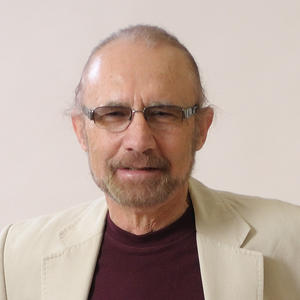
Professor Andrzej Wieckowski was born in Łódź, Poland, on February 22, 1945, the son of Andrzej and Halina (Motylewska) Wieckowski. He obtained his M.Sc. (1968), Ph.D. (1972), and D.Sc. (1981) degrees from the University of Warsaw, Poland; his Ph.D. degree was carried out under the direction of Prof. Jerzi Sobkowski. From 1973 until 1983, he held appointments initially as an associate and later as an assistant professor at the University of Warsaw. While in Poland, Andrzej stepped forward in 1980 to take a highly visible leadership role in the Solidarity Movement at Warsaw University. The imposition of martial law in late 1981 caused him to leave Poland and move to North America, initially as a visiting professor at Laval University in Quebec, Canada. From 1982 until 1985, he was a visiting scientist in Arthur Hubbard's laboratory at the University of California at Santa Barbara, in 1985 Dr. Wieckowski joined the analytical faculty of the Department of Chemistry at the University of Illinois as an assistant professor. He was promoted to full professor in 1996, and retired in 2013.
Dr. Wieckowski was a widely respected expert in the area of electrochemistry, especially with respect to the electrocatalytic properties of noble metals such as platinum and gold. His research focused on the use of electroanalytical, radiochemical, and spectroscopic methods to study the molecular-level structure and redox dynamics of the surfaces of electrodes, single crystals, and nanoparticles. Among the topics of his 250 scientific papers were the study of electrochemical processes by techniques such as ultra-high vacuum (UHV) methods, nuclear magnetic resonance (NMR), sum frequency generation (SFG), radioactive labeling of adsorbates, and microscopy; the comparison of theory vs. experiment in the modeling of electrocatalytic systems; and the chemistry of fuel cells. He was particularly known for his development - in tandem with Eric Oldfield - of electrochemical NMR, a technique which provides detailed chemical information about electrochemical interfaces and electrocatalysis. He also was the co-inventor, with Prof. Richard Masel, of the direct formic acid fuel cell. In all, he published some 250 scientific papers and book chapters. He wrote or edited several books, including Ionic and Molecular Environments in Heterogeneous Electrocatalysis (1993), Interfacial Electrochemistry: Theory: Experiment, and Applications (1999), and Catalysis and Electrocatalysis at Nanoparticle Surfaces (2003), and was the series editor for the multivolume Wiley Series on Electrocatalysis and Electrochemistry.
From 2002 until 2013, Dr. Wieckowski was the North American editor of the journal Electrochimica Acta. His work was recognized by many awards, such as the Outstanding Science Accomplishment in Materials of the Department of Energy (1992), the Procter & Gamble Lecturer Award (1996), Jacques Tacussel Prize of the International Society of Electrochemistry (1998), the David C. Graham Award and Gold Medal of the Electrochemical Society (2003), and the Electochemical Acta Gold Medal of the International Society of Electrochemistry (2006). He was a long-time member of the Electrochemical Society (fellow, 2007), the International Society of Electrochemistry (fellow, 2009), the Society for Electroanalytical Chemistry, and the American Chemical Society.
He passed away January 30, 2019, in Cottage Grove, Oregon. Former UIUC Chemistry Department Head Larry Faulkner said, “With his whole life, Andrzej has shown commitment to freedom, truth, and professional integrity. These are fundamental values of science. Andrzej has lived them wonderfully successfully, because he is also a focused man of extraordinary courage.” Andrzej is survived by his wife of 51 years, Teresa Prussak-Wieckowska, and a daughter, Zuzanna.